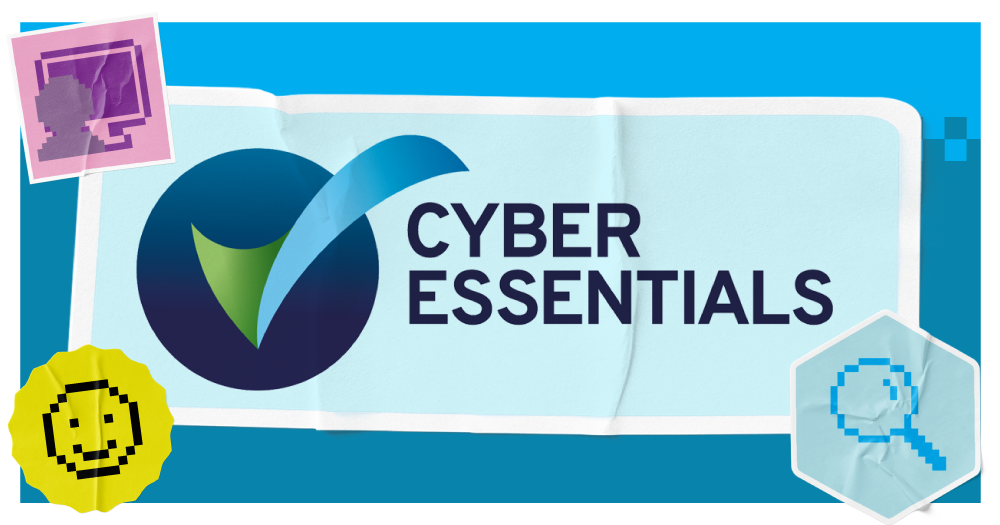As businesses expand onto more digital channels, whether it be to serve customers or improve internal efficiencies, the risk of cyber attacks increases. A report from this summer suggests cyber crime has risen 30% year-on-year in 2024 alone.
With cyber attacks becoming more frequent – and likely to continue to do so – security is now a pressing concern. Every business, large or small, can be susceptible to the dangers.
However, the cyber security landscape is a tricky one for many businesses to navigate. Very few organisations have internal security experts, leading to a knowledge gap that leaves them vulnerable.
Cyber Essentials is a framework designed to help businesses get the basic provisions required to protect themselves and their customers, with proven accreditation. It ensures you have the basics you need to protect yourself, even if you don’t have a dedicated cyber security team.
In this blog, we explore exactly what Cyber Essential is and how it can help your business tackle cyber risk.
So, what is Cyber Essentials?
Cyber Essentials is a UK government-backed scheme designed to help organisations protect themselves from common cyber threats. It’s supported by the National Cyber Security Centre (NCSC), the UK’s national authority on cyber security. It focuses on implementing a set of basic, preventative security controls that can significantly reduce the risk of successful cyber attacks.
There are five security controls the scheme follows:
- Boundary firewalls: Protect your network by using firewalls to control inbound and outbound traffic and minimise dangerous traffic.
- Secure configuration: Ensure that your devices and software are configured securely to minimise vulnerabilities.
- User access control: Implement strong access controls to protect sensitive data and systems against unauthorised users.
- Malware protection: Protect your devices from malware by using up-to-date antivirus and antimalware software.
- Patch management: Keep your software and operating systems up to date with the latest security patches.
Cyber Essentials was designed to be easy to understand and implement, even for small organisations. The scheme is also widely recognised, so can be a symbol of trust.
Why is it a good idea to have a Cyber Essentials accreditation?
There are many benefits for a business that gains Cyber Essentials accreditation.
Most obviously, it’ll enhance your security posture and decrease the risk of successful cyber attacks impacting your business. By implementing the five core controls, businesses can significantly reduce their vulnerability to common cyber threats, which can minimise financial losses, reputational damage and operational disruption.
It makes it easier to implement a robust approach to cyber security that you can manage and maintain long-term. This provides optimal protection of your valuable assets, while also driving resilience.
In some cases, Cyber Essentials can even grant you discounted insurance premiums for greater cost savings. Research from insurers also shows that organisations implementing the Cyber Essentials controls are 92% less likely to make a claim on their cyber insurance.
As Cyber Essentials is so widely recognised, having it can also increase your customer and supplier trust. It demonstrates a commitment to cyber security, reassuring clients and partners that your organisation takes data protection seriously. This can also help you to win more opportunities, especially if cyber security is a key criterion.
Similarly, Cyber Essentials can also improve your brand reputation among customers and make them feel safer when buying from you.
Finally, Cyber Essentials will help you to meet regulations. In certain industries, Cyber Essentials certification may be a requirement to meet regulatory compliance standards. It will also progress you towards more general standards, such as GDPR best practice.
What about Cyber Essentials Plus?
Alongside Cyber Essentials, the NCSC offer an advanced option, known as Cyber Essentials Plus. It follows similar principles as Cyber Essentials, but requires more stringent criteria to be met.
This typically includes:
- Vulnerability scanning: This process identifies potential weaknesses or vulnerabilities in your IT systems, such as outdated software or misconfigurations.
- Penetration testing: This involves simulated cyber attacks to test your organisation’s defences and identify any exploitable vulnerabilities.
- On-site assessments: In some cases, security experts may conduct on-site assessments to verify the implementation of security controls and identify any gaps.
- Security configuration checks: This ensures that your devices and software are configured securely to minimise risks.
As the controls are more rigorous, the benefits are also greater. It’s a marker of advanced cyber security which can boost trust and protect you against a wider range of sophisticated attacks.
Cyber Essentials Plus is recommended for businesses who:
- Want to tender for large value projects
- Work in highly regulated industries
- Are looking for an enhancement of their ISO 27001 certification
How do you get Cyber Essentials accreditation?
Cyber Essentials is designed to be achievable for any business. There are the core criteria you’ll need to meet to get your certificate.
But before that, you’ll need to purchase the Cyber Essentials scheme from an accredited Certification Body like IASME or IT Governance. Then, it’s time to follow the below steps:
1. Self-assessment questionnaire_
The first step of getting your certificate is getting most of the questions right on your Cyber Essentials questionnaire. This questionnaire assesses your organisation’s adherence to the five core controls of Cyber Essentials, covered by different sections.
Once completed, you submit the questionnaire to the Certification Body for review.
2. Technical validation (for Cyber Essentials Plus)_
If you’re pursuing Cyber Essentials Plus, you’ll need to undergo a technical validation process, which involves a more in-depth assessment of your security controls. This may include vulnerability scanning, penetration testing and on-site audits.
This requires independent verification by a certified Cyber Essentials Plus assessor, which is provided by IASME, so you will want to find your assessor first.
3. Certification_
If your self-assessment or technical validation is successful, you’ll be awarded Cyber Essentials or Cyber Essentials Plus certification (depending on which you’ve applied for).
The Certification Body will issue you an official certificate, which you can use to demonstrate your commitment to cyber security. The certificate lasts for 12 months, at which point you’ll need to recertify, following the steps above once more.
You can find out more about the process with our Cyber Essentials FAQs.
How to prepare for your Cyber Essentials assessment_
In order to pass the criteria above, you need to spend time implementing the controls into your business. Cyber Essentials will provide information to help you do this, but you still need the available resource and knowledge to apply them effectively.
If you don’t have this resource, it can make Cyber Essentials more difficult to achieve. This is why many businesses choose to work with a partner to support them through the accreditation.
This partner can work with you to get the appropriate controls into place, as well as conduct audits ahead of your assessment to find any issues that may lead to a fail. This will leave you with a detailed report of things to improve.
This will get you into shape to achieve the certification while reducing the burden on your business, especially if you don’t have dedicated security professionals or a significant IT team.
Getting started with Cyber Essentials_
Cyber Essentials is straightforward, once you know exactly what you need to implement. However, if you’re new to cyber security and the scheme, it can be hard to know where to start.
We’ve created a Cyber Essentials checklist to tell you everything you need to have in place.




